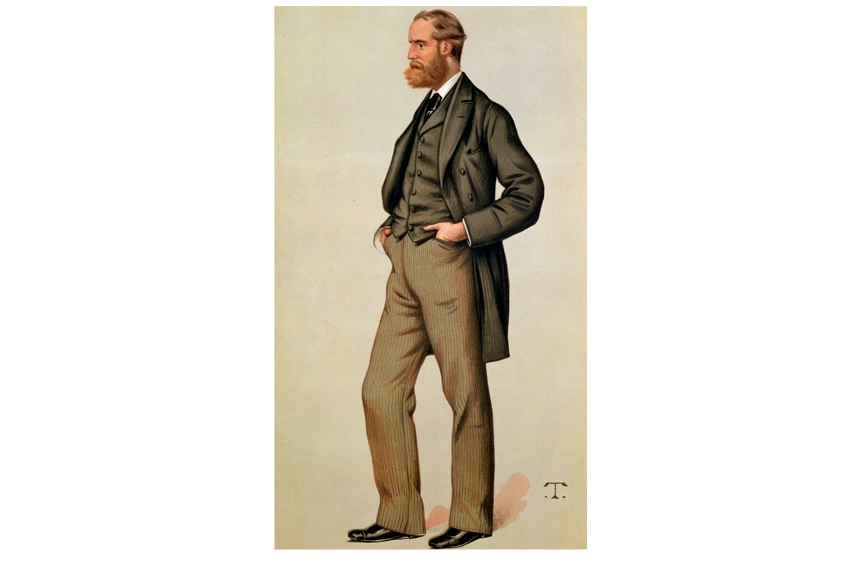Jonathan Swift’s Gulliver believed that the ideal British prime minister was a creature wholly exempt from joy and grief who applies his words to everything except to the indication of his mind. Swift’s dilation on the virtues of political froideur is only one of many ghosts evoked by Paul Bew’s riveting portrait of the man who seemed certain to be the first Irish prime minister of the Victorian age. In a characteristic confection of intimate portraiture and high-political history, Bew assesses the astonishing career of a lacklustre Protestant landlord who brought a Catholic populace to the threshold of parliamentary self-government in 1886.
And ‘astonishing’ scarcely does justice to the political achievements of the deeply strange, even dysfunctional man at the heart of Bew’s book. Readers are forced to ponder some fairly spectacular contradictions and improbabilities. How are we to reconcile the sleep-walking, paranoid inadequate who obsessed about the colour green and the number 13 with the parliamentary titan who came to terrify the Speaker of the Commons with his deadly procedural prowess by 1880?
Could the architect of sundry exquisite political alliances such as the ‘New Departure’ (linking Fenians with Irish parliamentarians) and the ‘Union of Hearts’ (linking Gladstonian Liberalism with Irish nationalism) be the same man who seemed incapable of writing a grammatical letter to the Times or distinguishing between the constitutions of the Isle of Man and Canada unaided? Was the clinical, even sadistic deposer of the gentle parliamentary federalist Isaac Butt the political Jekyll to the private Hyde-figure who threatened to jump the rails on Brighton Pier, dreamed of finding gold under his Wicklow estate, and had ‘the eye of a madman’ according to John Bright and Cardinal Manning?
Bew attends to this vertiginous doubling element in Parnell’s career with deftness and humanity. For him, Parnell’s peculiarities were products of his marginal Irish Protestant background, one that bequeathed an intense sensitivity to the precariousness of the Irish land settlement after 1688, and that also taught the virtues of subjecting English metropolitan politics to the strictest scrutiny. (His American mother certainly helped to ensure that her son would remember the day the Redcoats torched Mr Madison’s White House.) This complex background fed Parnell’s peculiar political trajectory. It helped make him a radical conservative, one who looked for structural change as regards the Irish land and constitution so as to make the country safe for bourgeois landlord rule by
eliminating the warping baggage of the Williamite confiscations.
Bew thus presents a rich portrait of a strategic conservative who accepted the logic of tactical radicalism, a logic that did not categorically exclude controlled forays into the terroristic nether regions of Irish Fenianism. Bew reminds us of Georges Sorel’s influential essay on violence here, where the French enthusiast for the
General Strike pays handsome tribute to Parnell’s grasp of the pedagogic effect of agrarian violence. Parnell’s weakness for occasionally lurid rhetoric when addressing ambitious Irish farmers certainly recalls Sorel’s belief that ‘warmly coloured images’ of violence move men more forcefully than syllogism or soliloquy.
Bew’s protean Parnell prompts tantalising comparisons. The ‘uncrowned king of Ireland’ comes down to us today rather like a Victorian version of Allen Guelzo’s moving portrait of Abraham Lincoln, the ‘redeemer president’ who found that the vindication of Henry Clay’s positively antique Whig vision would require distinctly revolutionary tactics after 1860. Bew’s emphasis on what might be called the creative implications of cultural and intellectual isolation also recalls J. A. Froude’s belief that Swift’s eloquence was actually a product of
inadequacy rather than insight, a kind of unexpected rhetorical starburst that grew out of his profound antipathy towards a metropolitan elite that consigned him to an Irish ecclesiastical limbo. And Paddy Bullard’s recent absorbing study of Edmund Burke’s rhetoric makes rather similar points to Bew about the way isolation can polish a receptive mind as much as pulverise it.
Readers may find themselves mentally chiselling various epitaphs on the Chief’s tombstone by the end. ‘Grattanite’ would do, as would ‘Irish Junker’ perhaps, or even ‘Bloody Fool’ if we focus on the divorce that ruined him and put a mighty gash in the hide of his parliamentary party after 1890. But these rather pale when compared with his tart intrusion into a Gladstonian monologue in 1886. Pressed by the GOM to supply a particular precedent, Parnell sighed, ‘I never read Irish history’. Had crass indifference ever seemed so potent?






Comments